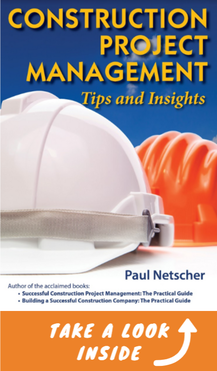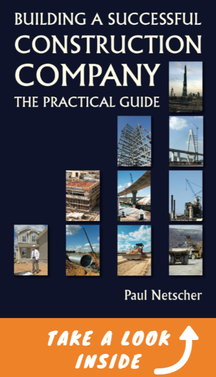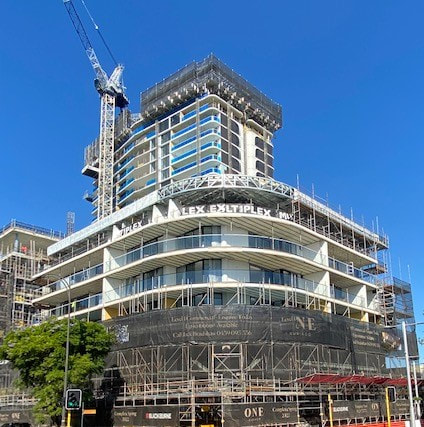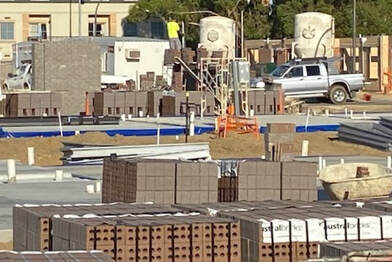"even a 10% improvement in efficiency can result in an additional 5% profit" Labour is often a major component of the costs on a construction project. It sometimes accounts for more than 50% of the costs, meaning even a 10% improvement in efficiency can result in an additional 5% profit. Of course the converse is true, and if labour is 10% less efficient than expected then the profit is reduced by 5%. But it’s usually more than just the direct costs of the workers. Low productivity means more workers are required, which adds additional costs for accommodation, transport, mobilisation and supervision. Poor productivity also impacts the construction schedule which can result in the client imposing penalties for late completion, as well as the contractor incurring additional overhead costs. Poor labour productivity is sometimes obvious when there are people standing idle on the construction site. However, often the poor productivity isn’t picked up before there are delays to the construction schedule, or the cost reports show labour losses. Usually by then it’s too late to rectify the problem. It’s imperative to analyse why there’s poor productivity. There’s some truth in the saying ‘a busy worker is a happy one’. Workers who are idle tend to chat to colleagues, even influencing and interrupting others who are working, and start to see and create problems where there weren’t problems before. (Read next week's article Why is there poor productivity on your construction project? which discusses the possible causes of poor productivity.) #constructionproductivity #constructionprojects #constructionmanagement "A combination of theory and actual..very detailed approach." Reader review of Construction Project Management on Amazon Paul Netscher has written several easy to read books for owners, contractors, construction managers, construction supervisors and foremen. They cover all aspects of construction management and are filled with tips and insights.
Visit to read more. The books are available in paper and ebook from most online stores including Amazon. © 2022 This article is not to be reproduced for commercial purposes without written permission from the author.
1 Comment
Recently Al Jazeera news network did a story where they interviewed Boeing workers constructing the Dreamliner passenger jet. These workers purportedly admitted to drug use and some said they wouldn't fly on the aircraft they had built. Some complained that Boeing was putting schedule ahead of quality.
Read the full story. Now to get an airplane certified requires the completion of untold checklists and numerous quality documents so this story may be hard to believe. However, this story got me wondering what workers are saying on construction projects. Would they avoid crossing the bridge they'd constructed, would they buy an apartment in the apartment block they’d just completed, would they work in the office tower they built or would they purchase the house they have just worked on? Some might argue that poor quality in an airplane is going to be more catastrophic than poor quality construction work on a building. However, there have been catastrophic failures of buildings, structures and bridges because of poor construction quality control. (See these pictures of a bridge constructed in Brazil for the 2014 world cup soccer tournament that collapsed killing one) Quality is more than just paperwork and checklists. It requires skilled workers who take pride in their work, knowledgeable supervisors who understand the required specifications and quality procedures, and project managers that don’t accept poor quality, and that ensure their personnel are trained and have access to the right materials and equipment. I've always found one of the best ways to assess quality is to ask the question; ‘Would I accept that quality in my house – would I be willing to pay money for that product?’ I guess that’s the same as asking the question; ‘Would I fly in the aircraft I’m constructing?’ If the answer is ‘no’ then obviously the quality of work in unacceptable. Talk to the workforce and ask them what they think of the quality of your project. Construction projects should have regular meetings between the client and the contractor which are minuted with a true record of what was discussed. The contractor's Project Manager should: 1. go to these meetings well prepared with the information requested from the previous meeting, if not already provided previously 2. ensure that the minutes are a fair reflection of the meeting and are accurate 3. have a list of points that need to be discussed and raise these under the correct sections in the meeting 4. take notes of items that need to be actioned 5. close out items in the minutes as soon as possible 6. immediately on returning to the office action items raised in the meeting 7. ensure that the meeting agenda covers items such as; access, information required, outstanding drawings, variations, drawing approvals, delays, progress, other problems or concerns and payments Documents That Will Make Your Construction Variation Claim Successful
Paul Netscher has written several easy to read books for owners, contractors, construction managers, construction supervisors and foremen. They cover all aspects of construction management and are filled with tips and insights.
Visit to read more. The books are available in paper and ebook from most online stores including Amazon. © 2022 This article is not to be reproduced for commercial purposes without written permission from the author. Companies require a skilled and motivated workforce to be successful. One of the biggest challenges to any business is to recruit and to retain skilled and experienced employees.
Read this article on employee engagement which has some interesting comments. Often we have employees with strengths which aren't utilised. Managers need to help them find and develop these strengths. An employee developing their strengths and having new opportunities is usually happier, more motivated, more productive and more likely to remain with the company. Wages often form a large portion of the costs of a construction project so even an improvement of 10% in productivity can have a dramatic affect on the contractor's profit margin. We have all heard of projects that have had massive cost over-runs, been completed late and some became 'white-elephants' when they were completed.
Read here about 10 projects that have gone wrong. These projects all had massive budget over-runs, some running into billions of dollars. Some projects were poorly conceived - the wrong project, in the wrong place, at the wrong time. The became 'white-elephants'. Some were built to satisfy personal egos. Some were political decisions. Many projects were not bid properly, were affected by corruption or were not managed properly. Despite these and numerous other examples there is a continuing legacy of disastrous projects. We have probably all experienced survey and setting out errors on our projects. These often result in structures and buildings being constructed in the wrong place, to the wrong dimensions or the incorrect level. These mistakes can be costly as either the structure has to be demolished and rebuilt correctly, or the structure or adjacent structures have to be modified to meet the client’s requirements. In addition there are delays to the schedule and the mistakes damage the construction company’s reputation.
However in this story the building company constructed a house on the wrong property. Read the full storey The builder now blames the water utility (Water Corporation) who they contracted to connect water to the property. Apparently water was connected to the wrong property. The builder looked for the property that had the water connection and then assumed this was the correct property and proceeded to build the house. Only when the house was almost complete was the problem discovered. Now the building company is suing the water utility for dereliction of duty because they connected the water to the wrong property. An aspect of concern is that the builder obviously didn’t have any permits or permissions to build on that particular property. Without the proper permits they may have encountered and damaged underground services or possibly damaged environmentally sensitive areas. One has to question where the client was during the construction process. The client should have either themselves, or through a nominated representative, have inspected the work to ensure the house was constructed in the correct position to the correct standards and specifications. Unfortunately this is not the first case of houses being built on the wrong property, and no doubt it won’t be the last case. There are also many cases of structures being constructed in the wrong position, across property boundaries or the wrong way around. I’ve also heard of contractors carrying out repairs on the wrong property or installing items in the wrong building. All very costly and embarrassing mistakes! There are a number of lessons from this: 1. Don’t assume the contractor who worked on the project before you performed the work correctly. 2. Double check all surveying and setting out before starting work. Obviously make sure you are at the correct property. 3. Because the building company has now decided to sue the water utility, with what seems to be a very spurious claim, the case has become very public. This mistake is very damaging for their reputation. Sometimes one should just accept your mistake, fix it, and move-on. 4. Clients shouldn’t always assume that construction companies know what they are doing. "Many contractors submit bids for literally every project that crosses their desk." Many contractors submit bids for literally every project that crosses their desk. This often means the estimating team works long hours, and bids are poorly put together with errors, poor presentation and little thought into ways to make the bid more attractive to the client. In addition contractors may end up winning the wrong project. "Contractors should focus on bidding for the right project, and then put all thought and effort into submitting a winning bid." Contractors should focus on bidding for the right construction project, and then put all thought and effort into submitting a winning bid. What is the right construction project?So what is the right construction project? There are many factors to consider which include:
"Sometimes the contractor should decline pricing a construction project." Many companies have been destroyed because they won the wrong construction project at the wrong price. Sometimes the contractor should decline pricing a construction project.
Paul Netscher has written several easy to read books for owners, contractors, construction managers, construction supervisors and foremen. They cover all aspects of construction management and are filled with tips and insights.
Visit to read more. The books are available in paper and ebook from most online stores including Amazon. © 2022 This article is not to be reproduced for commercial purposes without written permission from the author. "Some construction companies are desperate to find work so they’re willing to accept any construction project, at any price." Some construction companies are desperate to find work so they’re willing to accept any construction project, at any price. I’ve been in a similar situation before. However the risk of accepting a construction project at any price is that the company wins the project, works hard on it for several weeks, or months, only to lose money. How much better would it have been for everyone to sit at home, neither making money nor losing it? By not working on the project maybe the company would have had time to look for other more suitable construction projects? Maybe, by taking on the construction project the company didn’t have resources available to undertake a more suitable construction project when it presented itself? "When a project is in trouble management spends more time on it" The risk of taking on the wrong construction project not only impacts directly on the profitability of that project, but it impacts on other construction projects and the company as a whole. When a construction project is in trouble management spends more time on it than they normally would, trying to rectify and solve the problems. This time could be better spent on maximising profits on other more successful construction projects. In fact, the absence of management on the other projects sometimes results in them also turning bad. "Many of these projects end up costing the company large amounts of money." Working on a construction project should not be about being employed. The only reasons you want to be doing a construction project is so the company can make money, or occasionally so it can win further work which will make money. Frequently I see contractors win construction projects just because they’re desperate for work, or, sometimes contractors take on large and prestigious construction projects, believing it will enhance their standing with the public and their shareholders. Unfortunately, many of these construction projects end up costing the company large amounts of money - even leading to the contractor becoming bankrupt. #contractors #pricingconstructionprojects #projectbidding #constructionprojects
Other Useful Articles: Don’t make a mistake when you price your next construction project In construction it’s important to know your clients. It could save you. Paul Netscher has written several easy to read books for owners, contractors, construction managers, construction supervisors and foremen. They cover all aspects of construction management and are filled with tips and insights.
Visit to read more. The books are available in paper and ebook from most online stores including Amazon. © 2022 This article is not to be reproduced for commercial purposes without written permission from the author. |
Archives
June 2024
Note: We welcome genuine comments, especially comments that add additional information to the subject matter in the article. We however reserve the right to remove inappropriate comments, which includes comments that have nothing to do with the subject, comments that include inappropriate language, and comments that are an advertisement for a product or company, or which include an advertising link. Comments must be in English. We will not enter into discussion on why a particular comment was removed.
CategoriesCopyright 2016 - The attached articles cannot be reproduced for commercial purposes without the consent of the author.
The opinions expressed in the attached articles are those of the writer. It should be noted that projects are varied and different laws and restrictions apply which depend on the location of the contractor and the project. It's important that the reader uses the supplied information taking cognisance of their particular circumstances. The writer assumes no responsibility or liability for any loss of any kind arising from the reader using the information or advice contained herein. "I have what I consider some of the best books on construction management."
Books are available from: Amazon.com Amazon.co.uk takealot.com kalahari.com Amazon.in Amazon.de Amazon.fr Amazon.it Amazon.com.au Powell's Fishpond uread bokus Amazon.ca Amazon.es Other retail stores Available in paperback or on Kindle "28 YEARS OF CONSTRUCTION PROJECT MANAGEMENT EXPERIENCE, DEVELOPING SUCCESSFUL CONSTRUCTION PROJECT MANAGERS AND BUILDING SUCCESSFUL CONSTRUCTION COMPANIES"
|














 RSS Feed
RSS Feed




